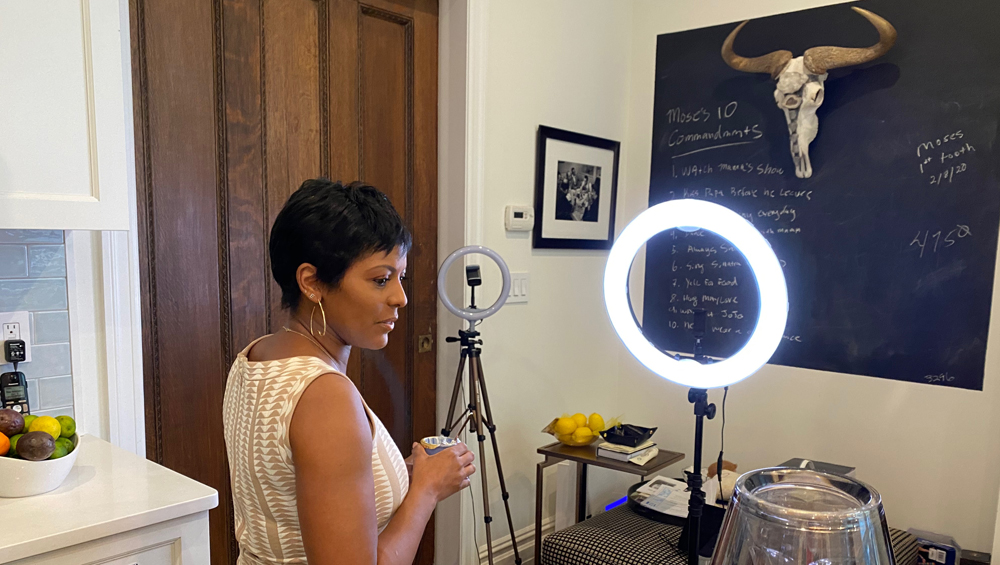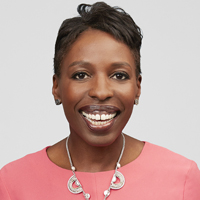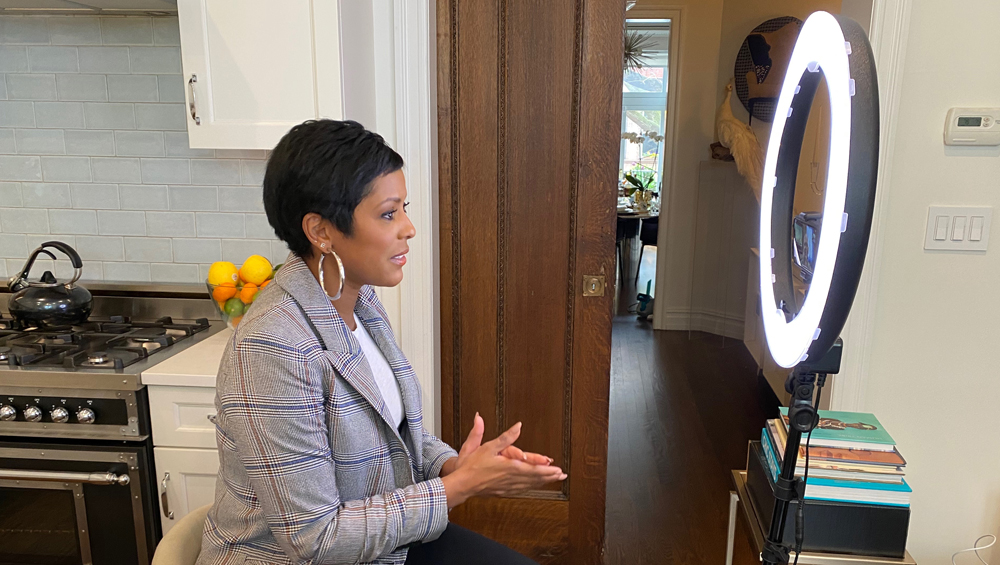
Tamron Hall Improvises With Empathy


Candi Carter
Candi Carter has the singular distinction of being syndication’s first showrunner to start the job in the pandemic.
Carter, a veteran producer of The Oprah Winfrey Show and The View, joined Tamron Hall as its new executive producer after the show had already scuttled studio production for the coronavirus. She met its titular host just once in person before its sudden remote shift. She still can’t say the same of any of the staff.
“It’s a very unique position to be in and then get the show on the air a week later,” she says.
Hall, meanwhile, is in a unique position of her own. She’s now shooting from her iPhone in her bright Manhattan kitchen along with an iPad that does double-duty as a baby monitor.
“It’s a very basic home setup brought to you by Amazon,” she says. That’s not entirely true. Her ring light is borrowed from her makeup artist, who normally uses it for videos on her own YouTube channel. Hall uses a microphone attached to the phone that one of the show’s producers dropped on her front step. And she’s particularly fond of the teleprompter app she recently downloaded to the phone.
Hall’s husband has been conscripted to P.A. along with feeding their one-year-old son as well as bird wrangling. “I have a parrot who is not very far from our studio kitchen and she is very loud,” she says.
As coronavirus-prompted remote production goes, Tamron Hall occupies a special place in the pantheon of improvisation.
“I had a very clear vision of what I wanted the show to look like, the stories we were going to tell” Carter says, having signed on to guide the show through its sophomore season. Suddenly, she was pushed into an orientation by fire.
“It was really just juggling a million balls and finding out who does what and what was that person’s name again,” she says. “Every day we introduce something and we troubleshoot and put a system in place. Every day we get better.”
And every day Hall, who thrives on empathy and connection as hallmarks of her show, must do so without the 150-odd studio audience members that complete the circuit for her. She says it hasn’t put her off her game.
“Maybe it’s because of the way I was raised. I don’t know if it’s my Texas roots, but I have always felt an intimacy. I have always felt connected,” she says. “This has reminded me that you can be in a room of 3,000 people and feel alone and you can also feel closeness through this incredible gadget in front of us.”
Hall moved gradually into remote production, starting with 15-minute from-home segments buttressed by encore content, then shifting to 30-minutes of original material to finally the full hour of original content, which resumed last week.
 She uses Zoom to conduct the celebrity interviews that have become a bit easier to book in the pandemic era. “There is a difference because we are in our homes,” Hall says. “People want to talk.” Lately those people have included former presidential candidate Andrew Yang, who opened up about his autistic son; Bachelor contestant Colton Underwood, who tested positive for COVID-19; choreographer Debbie Allen; and actor/comedian Tracy Morgan.
She uses Zoom to conduct the celebrity interviews that have become a bit easier to book in the pandemic era. “There is a difference because we are in our homes,” Hall says. “People want to talk.” Lately those people have included former presidential candidate Andrew Yang, who opened up about his autistic son; Bachelor contestant Colton Underwood, who tested positive for COVID-19; choreographer Debbie Allen; and actor/comedian Tracy Morgan.
She’s also held tight to “the same gospels of daytime TV: love and relationships, trying to live your best life, food,” she says. That focus has now widened to show the coronavirus’ brutal impact on everyday lives, both in terms of people’s health and livelihoods. Some viewers have been sending Hall video diaries they’re keeping.
A case in point was the Denver woman who poured her savings into launching an ice cream company, opening several locations before the pandemic knocked her business sideways. “Overnight she can’t even pay her rent or her mortgage,” Hall says. “It’s awful. Thirty employees she could have to lay off.”
After sharing the woman’s diary with viewers and interviewing her, Hall says orders have been coming in from across the country to help get it back on solid ground.
“People were making random donations and buying gift cards, really stepping up and helping out” Carter adds, noting it’s the kind of story Hall does best. “She just asks questions that get at the heart of things because she is genuinely curious and genuinely cares about people.”
While it’s Carter’s job to keep that pipeline of stories going, nothing about the realities of remote talk show production make that simple or efficient now. Her newly-minted showrunner status notwithstanding, she says every aspect of production is more time consuming.
In-studio taping for a show might normally take two hours, tops, for instance. From Hall’s kitchen it generally starts at 8:30 a.m. and goes until 1 p.m. Days are littered with Zoom meetings with individual teams that would otherwise happen far more expeditiously in person.
“And even delivering the shows takes forever because they are on home Wi-Fi networks,” Carter says. “It’s not like you are at work in the building that has a fiber line. They are transporting an entire hour from their house and it takes hours.”
Continuity issues are also harder to track as segments tape out of order, “and so you have to watch every little thing,” Carter says. “And we are streaming or screening shows and segments, there are edit notes that are coming back and forth. There is not enough time in the day.”
But Carter and Hall will put in those hours, knowing how precarious a young syndicated talk show can be, even if it is one of the rare ones to see a second year. Here, Hall’s signature empathy extends to her own staff: she sees how high the stakes remain for the show and how it could easily be a coronavirus casualty itself.
“These are uncertain times for everybody,” Hall says. “Twenty-two million people don’t have jobs, and we could be in that number. So it is my responsibility leading this show and leading this team to get us to solid ground.”
To read more TVNewsCheck coverage of how TV stations, station groups, news organizations and individuals are pivoting to work amid the coronavirus pandemic, click here.
































Comments (0)